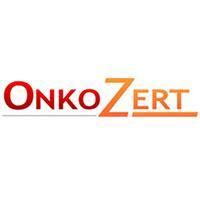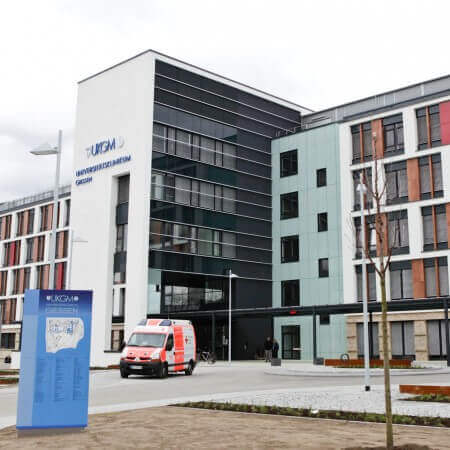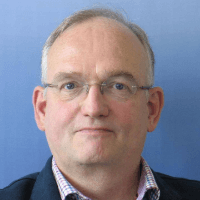Pancreatic Cancer — Proton Therapy: treatment in the Best Hospitals of Germany
Treatment prices are regulated by national law of the corresponding countries, but can also include additional hospital coefficients. In order to receive the individual cost calculation, please send us the request and medical records.

Department of Adult and Pediatric Proton Therapy
The Department of Adult and Pediatric Proton Therapy offers the full range of proton treatment and it is one of the leading and most progressive medical facilities of this kind not only in Germany, but throughout the world. The proton therapy is mostly used for the treatment of tumors of the eye, brain, spine and pelvic organs. Also, the proton therapy is an excellent treatment of tumors in children, since it has a minimal negative effect on the immature, sensitive tissues of the child’s body.







National Center for Tumor Diseases (NCT) Heidelberg
The National Center for Tumor Diseases (NCT) Heidelberg offers the full range of diagnostics and treatment of various oncological diseases. Since its foundation in 2004, the center has gained a reputation of one of the leading in Germany. The center is supported by the German Cancer Research Center (DKFZ) and the German Cancer Aid (Deutschen Krebshilfe). The center treats about 60,000 patients from 45 countries every year. Thanks to the outstanding research activities, the department has the very latest therapeutic opportunities that save lives for thousands of people.


Proton Therapy Center
The Proton Therapy Center specializes in an innovative type of radiation therapy for children, namely proton therapy. The medical facility is one of four centers in Germany offering proton therapy for cancer treatment in young patients. The center has been working since October 2015 in close cooperation with the Marburg Ion Beam Therapy Center and today can boast exceptional clinical experience in the field of its competence. Proton therapy is significantly superior to conventional radiation therapy in terms of dose control, dose distribution and side effect profile. Thus, it is an excellent alternative form of cancer treatment. The main advantage of proton therapy is that it has potentially fewer immediate and long-term side effects as compared to classical radiation therapy. The harmful effects on healthy tissues during proton therapy are minimized, which is especially important for children, as their brain and body are in the growth phase. In addition, proton therapy is provided on an outpatient basis and is an absolutely painless treatment, which is also important for young patients.

Proton therapy is an innovative method of irradiation that is used in the hospitals in Germany. It is safer than conventional photon radiation therapy. This is especially important for patients with pancreatic cancer, as the tumor is surrounded by anatomical structures that are very sensitive to radiation. The use of protons instead of photons helps not only improve cancer treatment results, but also reduce the risk of complications from the kidneys, liver, stomach and small intestine.
There are six proton therapy centers in Germany. The largest ones are in Heidelberg and Essen. It is here that most foreign patients with pancreatic cancer are treated. We can arrange your trip to one of these centers. You will receive safe proton irradiation without damaging the organs near the pancreas. The clinics in Germany provide comprehensive cancer treatment. In addition to radiation therapy, they use surgical interventions, including minimally invasive ones, chemotherapy, immunotherapy and other methods.
Content
- Why is proton therapy needed for pancreatic cancer
- In what cases can proton therapy be used for pancreatic cancer
- Irradiation after surgery
- Irradiation before surgery
- Proton therapy for inoperable tumors
- Why is it worth undergoing proton cancer treatment
- Why is it worth undergoing treatment in Germany
- Treatment in Germany at an affordable price
Why is proton therapy needed for pancreatic cancer
Pancreatic cancer is one of the most aggressive, prognostically unfavorable oncological diseases. The best treatment for this type of cancer is surgery. This is the only way to completely cure cancer.
Unfortunately, only in 20% of patients the tumor is considered resectable at the time of detection. In the rest, surgery is not performed for pancreatic cancer. This is due to the spread of metastases, tumor invasion into large vessels or surrounding organs and tissues. Sometimes medical contraindications are the reason for refusing the surgical intervention. In this case, the surgical treatment of pancreatic cancer cannot be performed even at an early stage.
The second most effective treatment for pancreatic cancer is radiation therapy. Nonetheless, the problem with this method is that it is not safe for health. The pancreas is surrounded by a large number of organs that are very sensitive to radiation: small intestine, stomach, kidneys. Therefore, doctors cannot deliver a large amount of radiation to the tumor. As the dose increases, the risk of severe complications increases as well.
Proton therapy is the safest form of radiation in oncology. Protons, unlike photons, release most of the radiation only when they reach the target, that is, inside the tumor. On the way to the tumor, a minimum of energy is released. Further healthy tissues close to the tumors are not irradiated at all. As a result, doctors can:
- Increase the dose of radiation, thereby obtaining a better treatment result without increasing the risk of complications.
- Maintain a standard dose of radiation, as in this case oncological results are achieved in the same way as with standard radiation therapy, but with less health risks.
In what cases can proton therapy be used for pancreatic cancer
The proton therapy for pancreatic cancer can be used for all types of tumors:
- Resectable – prior to surgery.
- Conditionally resectable – to achieve resectability and perform a subsequent surgical intervention.
- Unresectable – for local control of the tumor.
Proton therapy is used after surgery. It is a standard treatment in oncology to reduce the risk of recurrence. It is usually combined with chemotherapy.
So far, protons are used much less frequently than standard photon irradiation. This is due to the high cost of the procedure. The equipment for proton therapy is very expensive. Accordingly, the cost of treatment also increases. Thus, the price is the main deterrent to the use of protons as a standard method of irradiating pancreatic malignancies.
Irradiation after surgery
Most patients with pancreatic cancer undergo radiation therapy after surgery. Without it, the risk of recurrence, either local or regional, reaches 80%. Radiation helps destroy the remaining cancer cells. It reduces the risk of recurrence by up to 30%. As a result, many patients manage to get rid of pancreatic cancer completely.
After the surgical intervention, radiation doses of 50 Gy are usually used. Many patients develop complications from the small intestine and stomach, radiation ulcers and bleeding often develop. However, with the use of protons, the risk of these complications is reduced. Thus, the treatment becomes safer for the patient.
Irradiation before surgery
Doctors increasingly prefer neoadjuvant (preoperative) rather than adjuvant (postoperative) radiation for pancreatic cancer. According to many authors, this approach has advantages in terms of safety and effectiveness.
The problem with radiation after surgery is that it is carried out no earlier than 10-12 weeks. This is how much time is needed for the patient to recover, but the tumor can progress during this period. It is better to destroy cancer cells earlier. For this purpose, doctors use irradiation combined with chemotherapy.
The use of protons instead of photons helps reduce the risk of complications. Only 1 out of 20 patients develop grade 3 or higher toxicity. The rest tolerate radiation well, despite the fact that it is combined with chemotherapy. Doctors perform surgery 10 days after completing the course of neoadjuvant treatment.
Proton therapy for inoperable tumors
When starting irradiation of inoperable pancreatic neoplasms, doctors usually do not expect to cure the disease. They only want to achieve temporary local control of the tumor, reduce it in size and increase the patient's life expectancy.
Nevertheless, with the use of protons, due to the possibility of increasing the radiation dose, even unresectable tumors sometimes become resectable. Such cases have been repeatedly recorded in clinical studies. For example, Kathryn E Hitchcock, R Charles Nichols and their colleagues treated 15 patients with protons. As a result, 6 of them achieved indicators of neoplasm resectability. Similar results are shown in a study by scientists from the University of Florida. They treated 11 people with inoperable pancreatic cancer with protons. 4 of them achieved the criteria of resectability.
Thus, about a third of patients after proton irradiation can expect to be suitable candidates for radical surgery. It shall be recalled that it is the surgical intervention that is the only way that can provide a cure for pancreatic cancer. The proton therapy by itself, with all its advantages, cannot destroy all cancer cells. Without surgery, cancer will recur sooner or later.
But even if doctors cannot perform surgery, proton therapy can help ensure long-term local control of the tumor. A person can live for several more years. He gets a better quality of life due to less toxicity of the treatment.
Why is it worth undergoing proton cancer treatment
Medical specialists in Germany use proton therapy for almost all stages of pancreatic cancer, except metastatic cancer. This treatment option helps:
- Reduce the risk of tumor recurrence after surgery.
- Achieve resectability of the neoplasm, if at the moment a radical operation is considered impossible.
- Long-term control of the primary tumor if it cannot be removed with surgery.
Similar goals can be achieved with photons. This type of radiation remains the main one in the clinics in Germany. Protons are typically used to achieve less treatment toxicity. Proton therapy can sometimes be used instead of photon therapy to increase the efficiency of radiation, since more radiation can be delivered to the target with protons without increasing the number of severe side effects.
Why is it worth undergoing treatment in Germany
Thousands of patients from all over the world visit the hospitals in Germany for cancer treatment. The country demonstrates significant advances even in the treatment of such an aggressive form of oncopathology as pancreatic cancer. German hospitals use the most advanced treatment options, including proton therapy. There are several reasons for you to undergo proton irradiation in this country:
Extensive experience. Proton therapy began to be used in Germany in the twentieth century. There are six proton therapy centers here, which is twice as many as in the UK or France. This number is bigger than in any other country in Europe.
Possibility of treating pancreatic cancer. Although protons are also used in many other countries, they are commonly used to treat other diseases. As a rule, the proton therapy is used for the tumors that are not displaced with breathing. These are head and neck tumors. Doctors in Germany successfully use protons for the treatment of cancers of the abdominal, thoracic and pelvic organs. Pancreatic cancer can also be treated here.
State-of-the-art equipment. Leading oncology hospitals in Germany are equipped with the latest medical technology. They use an innovative method of tumor proton irradiation: intensity modulated proton therapy. It allows doctors to safely irradiate even large neoplasms with a complex configuration, located near functionally important, sensitive to radiation of organs. The systems for tracking the movements of the anterior abdominal wall during breathing will help direct proton beams precisely to the target, thereby minimizing damage to the surrounding organs and tissues.
Ability to undergo treatment quickly. WIthout timely treatment, pancreatic cancer can progress. Having lost time, in the end, at the start of therapy, it may turn out that the tumor has become unresectable or has spread distant metastases. Therefore, it is advisable to undergo treatment where you will not have to wait for proton irradiation too long.
Some countries only have one or two proton therapy centers. In these cases, doctors try to use proton therapy only for those patients who will get the most benefit from this type of radiation therapy. The patients with pancreatic cancer are not included in this group. First of all, protons are used to irradiate children with brain tumors, patients with neoplasms of the base of the skull, eyes, head and neck tumors. Due to the limited medical resources, the waiting period for patients with pancreatic cancer may be too long.
Nonetheless, there are six proton therapy centers in Germany, four of which have movable gantries. They opened in 2009 or later. These centers have state-of-the-art equipment that makes it possible to successfully irradiate tumors of the abdominal organs. Two of the six centers have 4 gantries at their disposal, so they can admit a large number of patients. Thus, the waiting time for treatment is minimal. You will have time to get medical help before pancreatic cancer progresses and becomes incurable.
Affordable prices. The cost of proton therapy in German hospitals is lower than in other developed countries. There are many more proton therapy centers in the United States and Japan, but prices are much higher there. The clinics in Germany offer the best price-quality ratio for proton therapy. The treatment of pancreatic cancer is more expensive here than in Eastern Europe, but it is more effective. The price of proton therapy in Germany is lower than in the United States and Japan, but the effectiveness of the treatment is the same.
Combination with other treatments. It is beyond doubt that protons are better than photons, as they are more efficient and safe for health. However, protons alone cannot cure pancreatic cancer. Other treatment options are usually additionally used. Germany offers all modern pancreatic cancer treatments. Doctors in this country use not only standard methods, but also advanced technologies in oncology: laparoscopic and robot-assisted operations, embolization of arteries feeding the tumor, immunotherapy and targeted therapy. In Germany, you will be treated as effectively and safely as possible, with minimal trauma and a low risk of severe complications.
Treatment in Germany at an affordable price
To undergo proton therapy for pancreatic cancer in one of the German hospitals, please use the services of the Booking Health company. On our website, you can find out the cost of treatment in different hospitals, compare prices and book a medical care program at a favorable price. The cost of proton therapy for pancreatic cancer is between 85,600 EUR and 86,200 EUR. The treatment of pancreatic cancer in a German hospital will be easier and faster for you, and the cost of treatment will be lower.
Please leave your request on the Booking Health website. Our employee will contact you and provide a consultation about treatment in Germany. The Booking Health company will take care of the organization of your trip. We will provide the following benefits for you:
- We will select a hospital for treatment in Germany, whose specialists use proton therapy for pancreatic cancer.
- We will solve the problem of the language barrier, provide interpreting services and establish communication with your attending physician.
- We will reduce the waiting time for the start of the medical care program and book a doctor's appointment on the most suitable dates.
- We will reduce the price. The cost of treatment in German hospitals will be lower due to the lack of additional coefficients for foreign patients.
- We will solve any organizational issues: documents for entering the country, transfer from the airport, hotel, etc. A coordinator will support you. We will always keep in touch with you and will help in case of unforeseen situations.
- We will prepare a program and translate medical documents. You do not need to repeat the previously performed diagnostic procedures.
- We will help you keep in touch with the hospital after treatment in Germany.
- We will organize additional diagnostic examinations and treatment in a German hospital, if necessary.
- We will buy medicines abroad and forward them to your native country.
- We will help you keep in touch with the hospital and the doctor after treatment in Germany.
You will receive treatment from the best doctors in the world. The Booking Health employees will help reduce the cost of treatment and take care of all organizational issues, and you will only have to focus on restoring your health.
Authors:
This article was edited by medical experts, board-certified doctors Dr. Nadezhda Ivanisova, and Dr. Bohdan Mykhalniuk. For the treatment of the conditions referred to in the article, you must consult a doctor; the information in the article is not intended for self-medication!
Our editorial policy, which details our commitment to accuracy and transparency, is available here. Click this link to review our policies.

